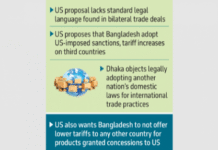New Age
HM Murtuza | Jul 28,2020
 Bangladesh’s banking sector witnessed the highest fall in asset yield in the Asia-Pacific region during the last six years despite the fact that the banks’ funding cost declined by more than 2 per cent during the same period, according to a report released by Moody’s Investors Service.
Bangladesh’s banking sector witnessed the highest fall in asset yield in the Asia-Pacific region during the last six years despite the fact that the banks’ funding cost declined by more than 2 per cent during the same period, according to a report released by Moody’s Investors Service.
The report also said that the banking sector in the region would face deterioration in profitability as an impact of coronavirus pandemic.
Besides, it said that the efficiency gains from digitalisation would be small as banks were rechanneling cost savings to technology investment while operating expenses of the banks in the region would grow faster as coronavirus outbreak accelerated digital transformation.
Moody’s Investors Service, an US-based credit rating entity, published the sector in-depth report titled ‘Banks – Asia-Pacific: Structural changes hurt profitability, hitting laggard banks harder’.
In its evaluation on Bangladesh’s banking sector, the report showed that the country’s banking sector had witnessed around 1.25 per cent decline in yield against asset.
The net interest margin shrank across most APAC systems between 2014 and 2019 as declines in asset yields, a result of accommodative monetary policy adopted by many central banks in the region, were greater than reductions in funding costs, the report mentioned.
Speaking about the correlation between the decline in profitability of the banks and the monetary policy, Mutual Trust Bank managing director Syed Mahbubur Rahman told New Age, ‘Monetary policy should be formulated based on the market situation, but we have seen the formulation of monetary policy on political consideration.’
‘Sometimes, the government wants to get an accommodative monetary policy due to prevailing economic situation on political consideration instead of considering the state of the banking sector,’ he said.
For instance, in recent years two governors of the Reserve Bank of India have stepped down from their post due to their conflicts with the Indian government, Mahbubur said.
About the fall in asset yield in the last six years, Mahbubur, also a former chairman of the Association of Bankers, Bangladesh, said that the interest rate in the country’s banking sector dropped significantly during the period and so did the asset yield.
Many banks had previously charged up to 20 per cent interest against loans to the small and medium entrepreneurs and the rate has now come down to as low as 9 per cent from April this year as the central bank set the lending rate ceiling for all the sectors at 9 per cent.
For around two years, businesses had mounted pressure on the government for introducing single-digit lending rate that prompted the government to instruct the central bank to set the ceiling.
In 2014, many banks had issued credit to the SMEs at the rate of 18 per cent and the rate came down to 11 per cent in 2019.
Moody’s in its report also said that the banks’ return on asset declined in 12 out of the 17 countries’ banking systems in the Asia-Pacific region during 2014-2019.
In many of the 12 systems, ROAs declined because net interest income decreased as a percentage of total assets, despite reductions in operating expenses and loan loss provisions by varying degrees, it said.
‘We expect profitability of banks in Asia-Pacific region will deteriorate in the next few years as the coronavirus outbreak accelerates structural changes in their markets,’ the report said.
Mahbubur said that as a large number of the population in this region had faced earnings erosion as an impact of the coronavirus outbreak, their capacity to carry out financing transactions with banks deteriorated.
With a view to scaling up profitability, the banks are increasing their efforts to increase fee income, the report said.
In the coming years, operating expenses of the banks in the region will grow faster as coronavirus outbreak accelerates digital transformation.
‘Increases in operating expenses are likely to accelerate in the next few years due to investment in technology as the coronavirus outbreak boosts demand for the digitalisation of banking services,’ the report said.









